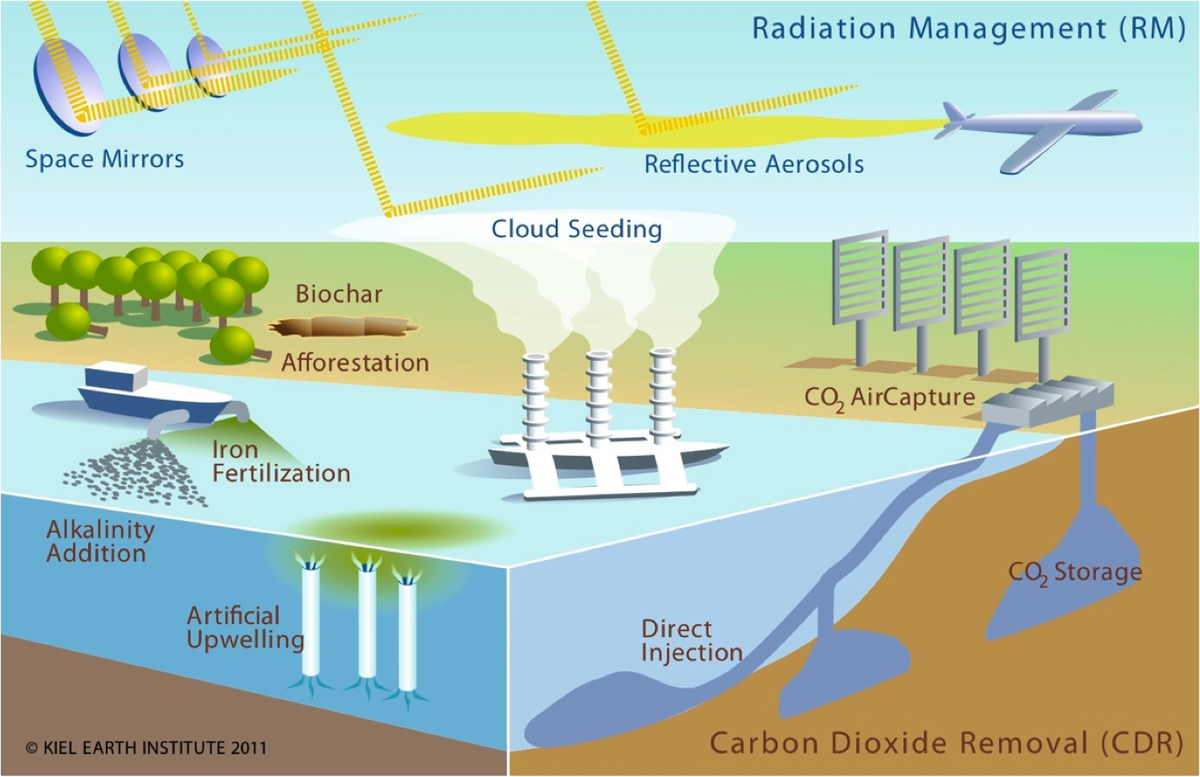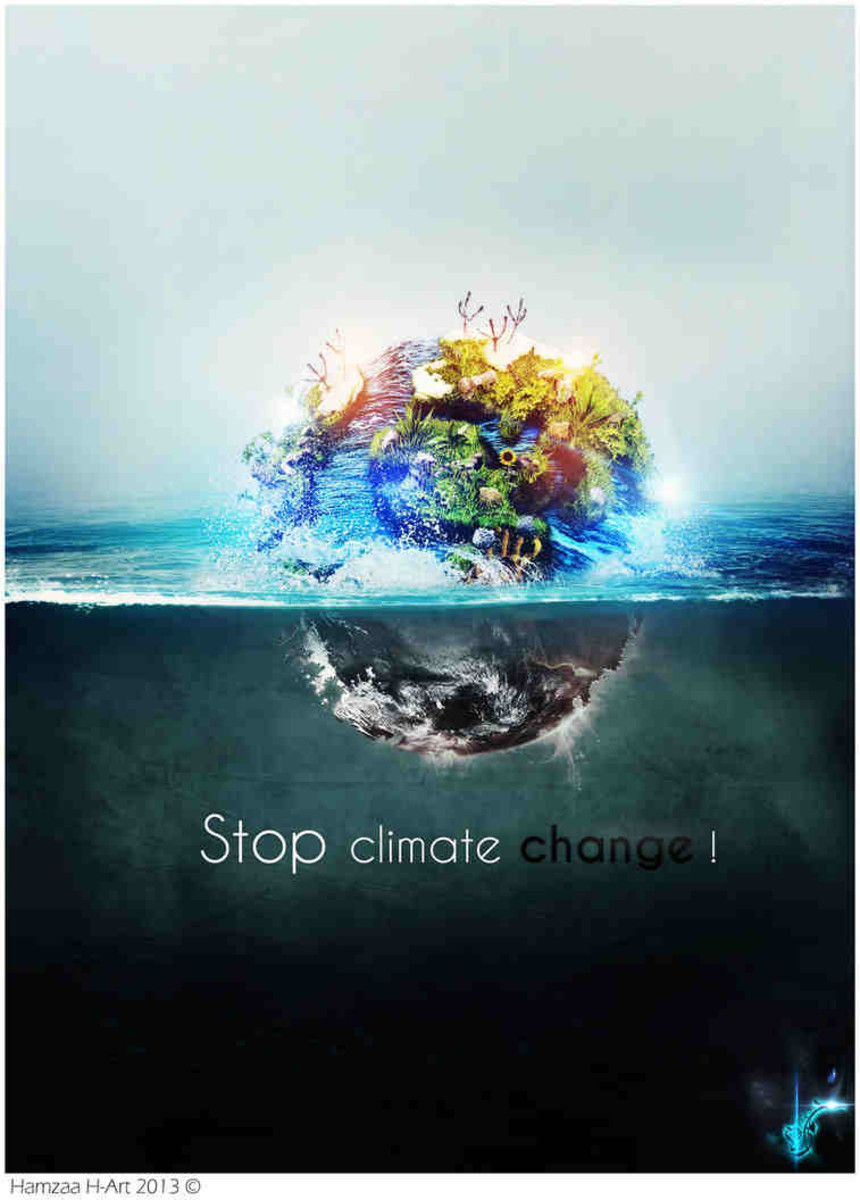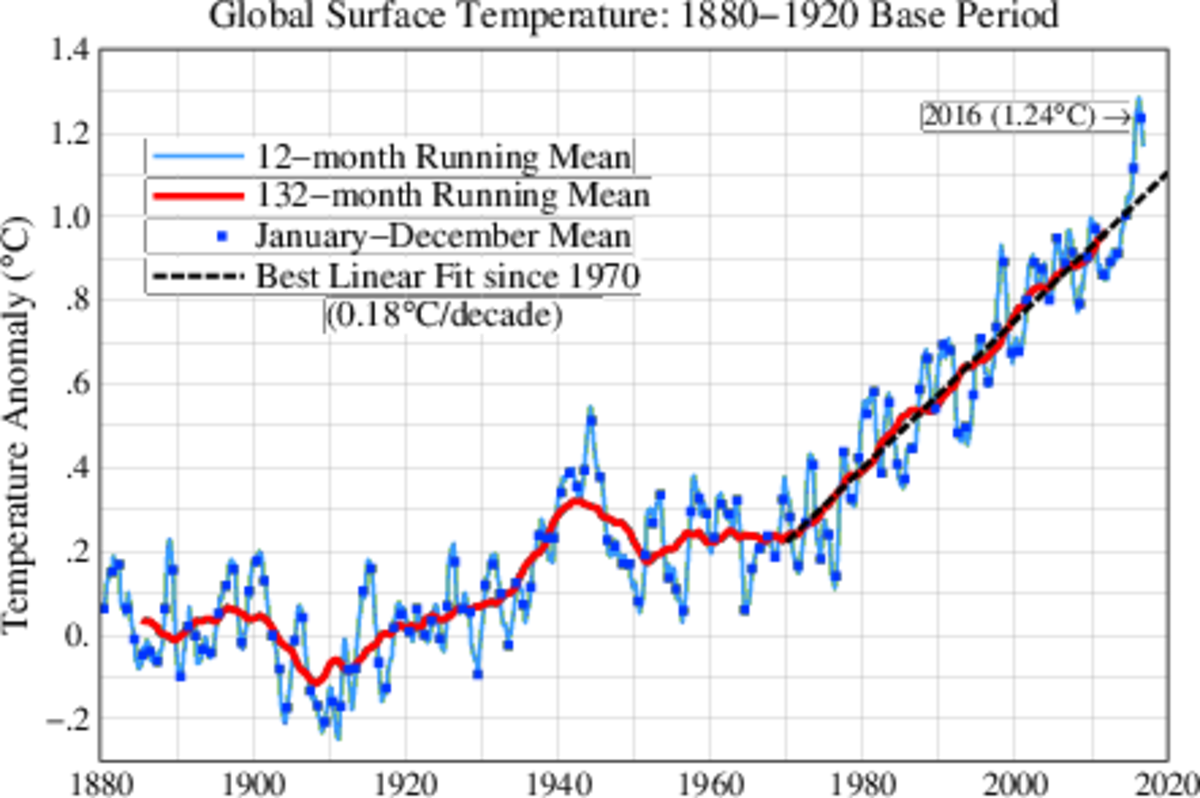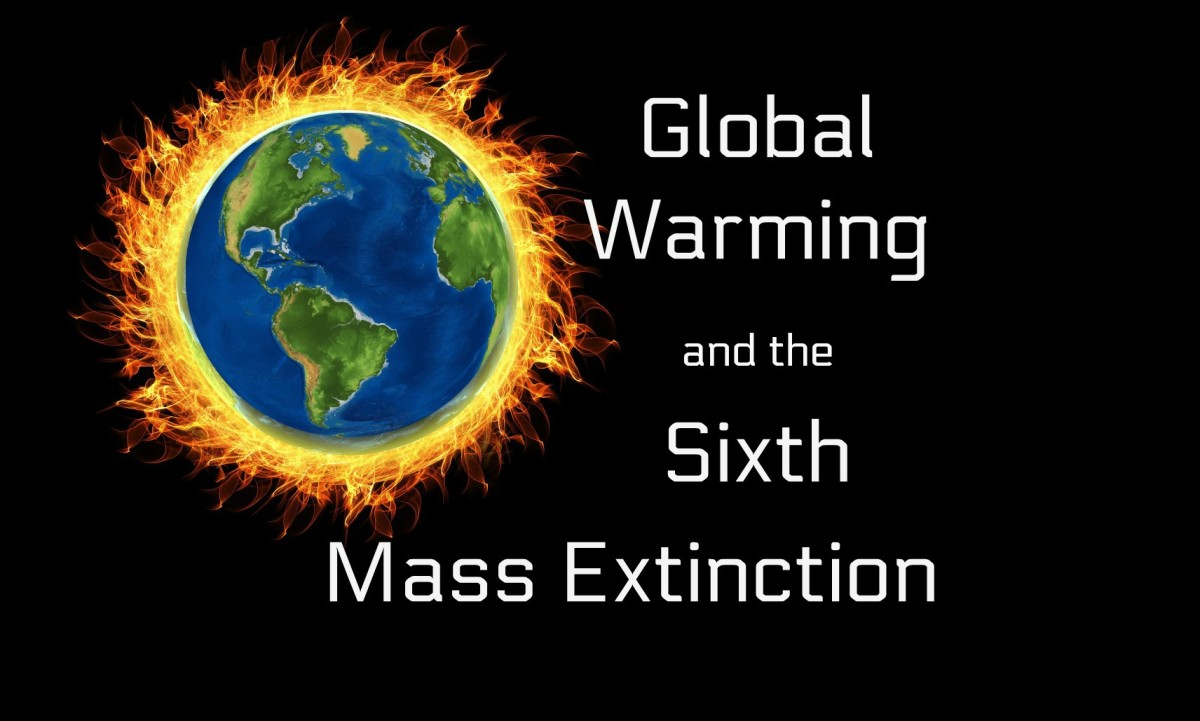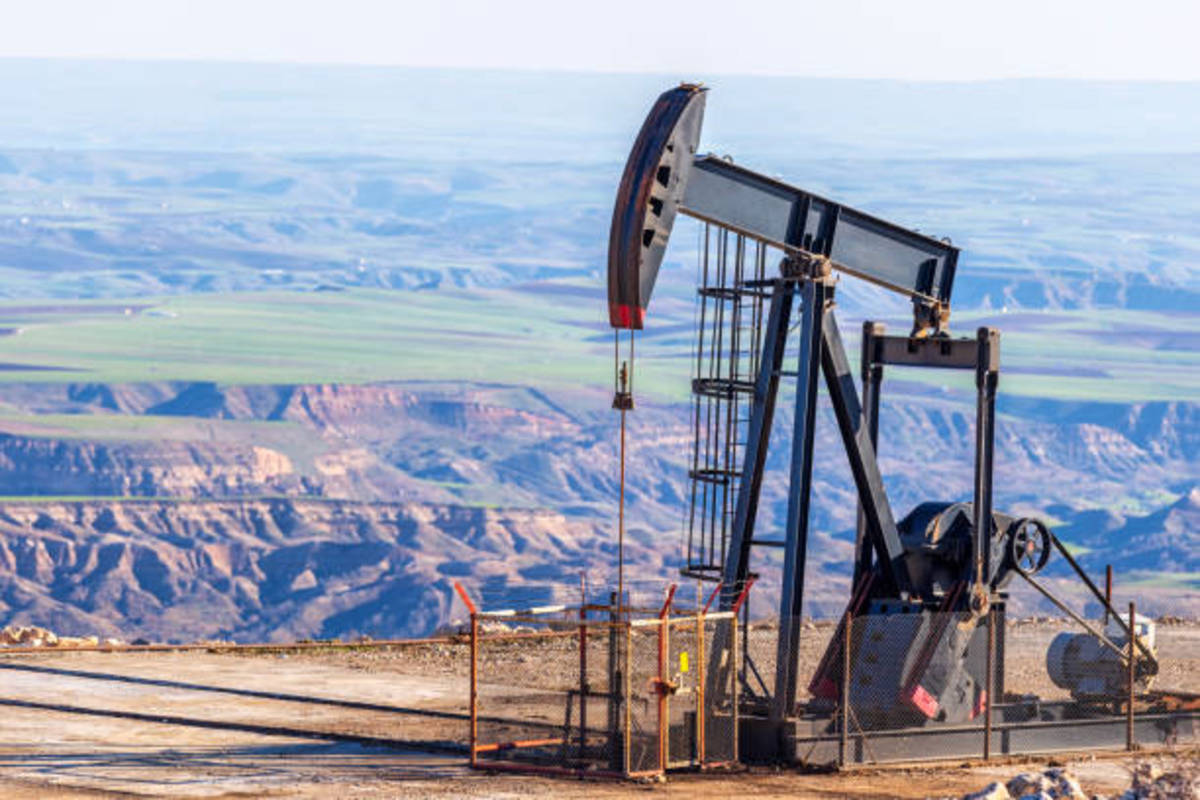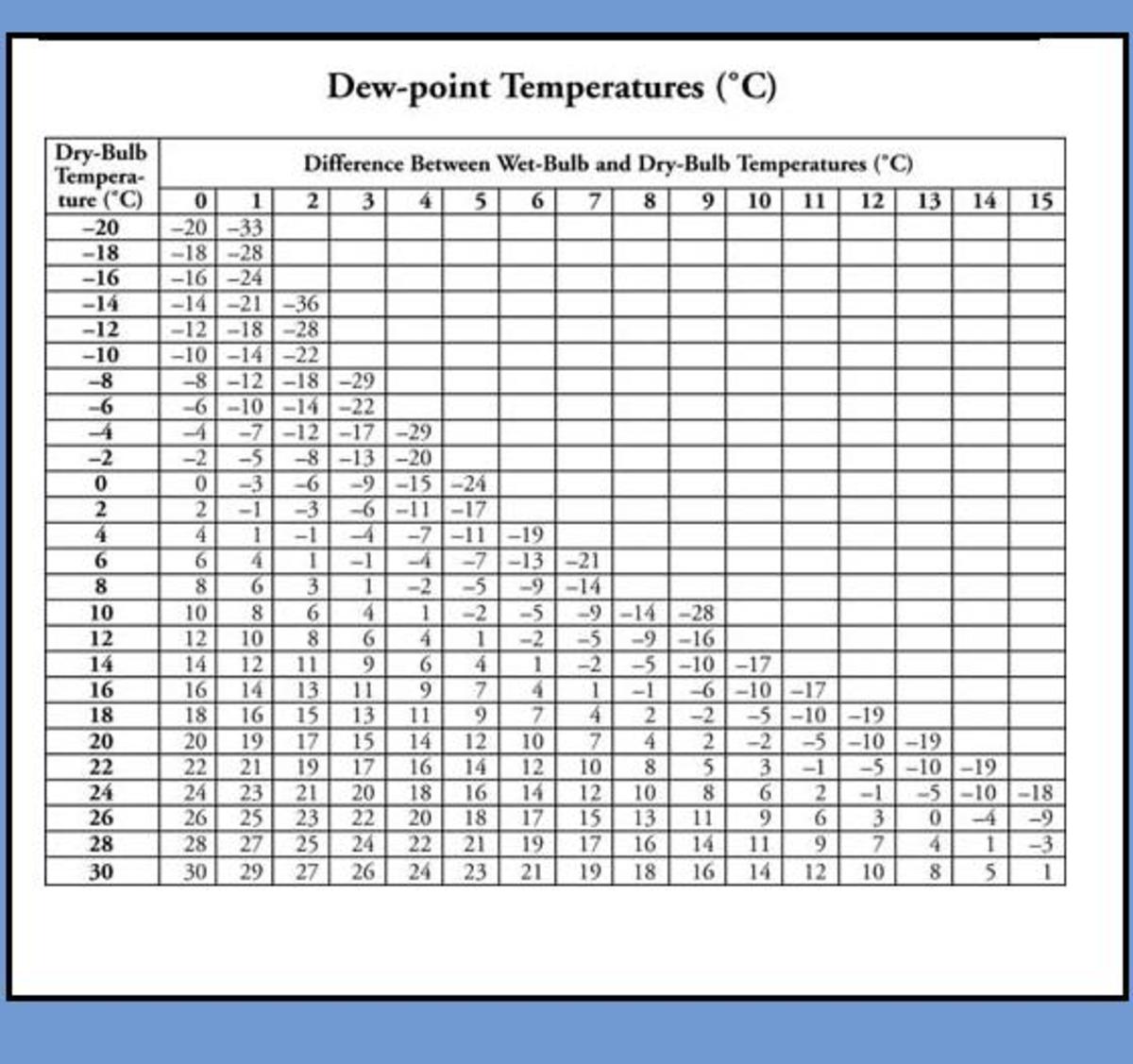Global Warming: The Science
Introduction
I'm going to start this hub in perhaps a slightly unusual fashion. Every so often, an issue comes along that attracts widespread support. Unfortunately, increasingly the media assume the mantle of declaring what "all good people believe" and create a situation which massively impinges upon the right to free speech, where debate is stifled, because the "accepted wisdom" is that a certain thing is true, and anyone who disagrees with it is an idiot, or worse still a bigot. This attitude from the media is itself bigoted, of course, but it is hard to argue against and be heard, once any issue has attracted widespread support.
So for example, it is very difficult these days to have a reasoned discussion about global climate change, about immigration, about the muslim religion, about differences between men and women, about cultural differences, etc. without being branded a fool, a bigot, a racist, sexist, etc. People now confuse criticism of an individual's actions or beliefs as a criticism of an entire race or religion; or criticism of a widely accepted theory as some kind of heresy, deserving of contempt and criticism which often borders on, or descends into, abuse .
Thus, a university (through non-platforming), or a government even, may pick up on a perceived majority "national opinion" or "global opinion", and then start to implement policies which force people to behave in support of that view. However, that view may not actually be a majority view in the first place, and secondly, the government may not have the support of the populace to inflict mandatory adherence to the view, even if it is a majority view.
This hub is about one such "contentious issue" which is man-made global warming. There is now a consensus that mankind is causing global warming, and it is proven beyond all doubt, and thus it is no longer acceptable to put forward an argument that throws doubt upon this "fact". Anyone who does is branded an idiot, first of all, and secondly a dangerous heretic trying to persuade everyone that we don't need to change our ways, when in fact the planet is dying, all due to our own actions, and we need to take immediate action or the planet will not be here for our kids to enjoy.
Perhaps it is because the stated consequences are so severe (the end of the human race) that people feel so passionately about it, but actually there is much evidence that mankind will simply adapt to any climate change, rather than be wiped out by it.
The point is that there is now an international "accepted wisdom" that mankind is, without doubt, causing global warming. Therefore, so many are falling over themselves to jump on the bandwagon of being seen to "tackle the issue" to save mankind, which sounds like a very worthy cause, and thus for anyone to argue that they might be wasting their time, or that mankind is not actually the cause of global warming, is met with incredulity that anyone could have such a "head-in-the-sand" attitude, or be so outrageously uncaring about the future of our planet, and this usually descends into not wanting to listen to the arguments being put forward, or worse still, trying to prevent those views being expressed at all.
So, if you have an open enough mind, and the intelligence to value different opinions, and to explore a variety of theories on a subject, then please read on. If you are a bigot who doesn't want to hear anything that goes against your own strongly held views or beliefs, then you should still read on, as you might read something that will make you think!
What do I think?
Before I go any further, I want to say some things about my own approach to life and the planet. I have an engineering background, and from that have an overwhelming desire to re-cycle, re-use, and not to discard. I have a house full of clutter that "might come in useful one day", and every so often some of it does. Most never will.
I also do not believe in cutting down rainforests, concreting over grass, and continually impinging on green belt land to allow further urbanisation. There is no debate about the fact that plant life forms the lungs of the world. It is plants that take carbon dioxide and convert it back into oxygen for us to breathe. Without plants, all animal life on the earth would be wiped out. Only some bacteria and other anerobic life would survive.
So, yes, I want to preserve the planet, but also, I have an extensive scientific knowledge, and I like to examine major issues like global warming and climate change with a rigorous scientific approach, not simply to believe what the media tells me.
Let's start with some simple thoughts
The difference between summer and winter is the difference in proximity of our part of the planet to the sun, as the earth rotates around the sun on its inclined axis. When we are nearer to the sun, it is warmer, and is summer; when we are further away it is colder, and winter.
On a cloudy day, the rays of the sun are prevented from penetrating to the surface of the earth by the clouds, and it is colder than on a sunny day, where the sun reaches the earth's surface.
Everyone will know how hot things get when in direct sunlight all day long.
The sun goes through cycles of giving off more heat, and giving off less heat. High sunspot activity means the sun is giving off more heat, low sunspot activity means it is cooler.
Surprise, surprise, the average global temperature can be clearly shown to vary with sunspot activity - i.e. global warming and cooling has a link to the changes in the temperature of the sun.
So, there's a start. Without anything to do with mankind whatsoever, there will be a cycle of global warming and cooling.
As mentioned above, cloud formation and cloud activity are also going to have an impact on the global temperature. There is much scientific evidence that sunspot activity also has an effect upon cloud formation, as cloud formation is affected by cosmic rays, and sunspots produce an abundance of cosmic rays.
One more thought at this point: you may have noticed that people have stopped talking about "man-made global warming", and instead refer to "man-made climate change". This is because there is no proof than mankind's activity is causing the planet to warm up. Indeed, the figures for average global temperature published by the Met Office, the UN and NASA, all show that the average global temperature did not increase between 1998 and 2008 - in fact it went down initially, and then came back up. 2009 and 2010 are warmer years, but if mankind has been pumping more and more greenhouse gases into the atmosphere over the last decade, why did the temperature stay stable, and not shoot up, between 1998 and 2008?
What about longer term trends?
Well, this is where the science gets more interesting. The earth has been too hot for life to exist and too cold for life to exist many times during its existence. Nearly all life was exterminated in the last ice age when the polar ice caps grew to cover almost the entire planet in ice, for an extremely long period from 110,000 years ago to 10,000 years ago, with the peak of coverage of the earth's surface being 18,000 years ago.
Since then the earth has been hotter than it is today - in the Middle Ages between AD950 and 1250, the "Medieval Warm Period", temperatures in Europe were between 1 and 1.4 degrees Celsius warmer than they were on average through the 20th century, and average winter temperatures in England were 6 degrees Celsius. Then, between 1500 and 1700 there was a "mini ice age" where temperatures were 1.5 degrees Celsius lower, and with greater seasonal variation.
However, there is some debate as to whether the high temperatures recorded in Europe during the "medieval warm period" were limited to the Northern Hemisphere, as there is little evidence of the same phenomenon occurring in the Southern Hemisphere.
The key point to be made is that severe climate changes (changes that really significantly heat up the earth or cool it, such that life on the planet is threatened) occur over thousands of years, or tens or hundreds of thousands of years, not over decades. Over the last two centuries, we are looking at the effect of changes of temperature of just a couple of degrees Celsius, and, as we have seen, that has not caused the wiping out of mankind.
So, the key issue is what is the true long term trend for climate change, and what is causing it, and how big does the temperature change have to be to affect the survival of mankind?
Here's a graph
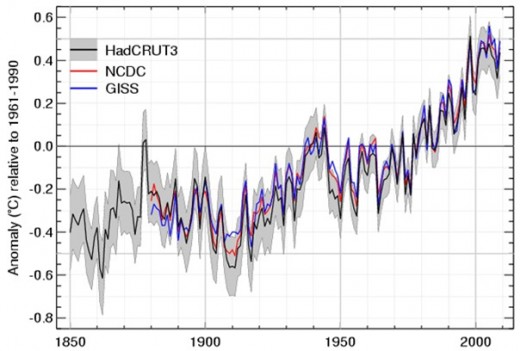
Global temperature 1850-2008 Average annual surface temperature, based on measurements by meteorological stations, ships and satellites, as reported independently by three different groups: NOAA (NCDC) and NASA (GISS) in the US, and the combined Hadley Centre and Climate Research Unit of the University of East Anglia in the UK (HadCRUT3).
Source: World Meteorological Organization.
What does the graph tell us?
Firstly and obviously, it tells us that the temperature of the planet has been rising steadily from about 1900 to the present day, as an overall trend. However, still we are only talking about a change of just under 1 degree Celsius. It also shows the variations that can happen over a decade or so, where temperature rises and falls by 0.1 or 0.2 degrees.
Now look at the graph below from NASA, which separates the data for the Northern and Southern Hemispheres:
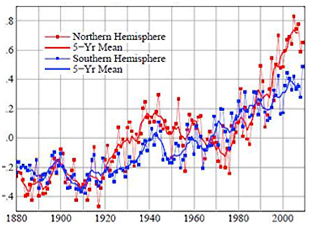
The NASA global temperature data, separated into Northern and Southern Hemisphere curves. Note the greater variation in the North. (Warming was especially pronounced in the Arctic, as predicted.)
For latest figures see the NASA-GISS site
What else does this graph tell us?
It shows that temperature variations have been greater in the Northern Hemisphere than in the Southern Hemisphere, which seems to be consistent with data going back to the "Medieval Warm Period" where there is little evidence that it also occurred in the Southern Hemisphere.
What about CO2 and other greenhouse gases?
The amount of CO2 in the atmosphere is tiny. It is 390 parts per million (as of 2010), or 0.039%. It has risen by 0.0002% over the last decade. The gas composition of the atmosphere is: (by volume in dry air) 78.09% nitrogen, 20.95% oxygen, 0.93% argon, 0.039% carbon dioxide, plus tiny amounts of other gases. The air also contains about 1% water vapour on average.
Are there other so-called "greenhouse" gases? Yes. Water vapour itself is a greenhouse gas, and then there is methane (the principal component of natural gas), nitrous oxide (emitted by diesel engines and rockets), and ozone (naturally formed in the earth's upper atmosphere, and protects us from the more harmful effects of the sun's electromagnetic radiation). Also, there are HFCs (Hydrofluorocarbons) (used as a replacement for CFCs {as refrigerants} and in the semi-conductor industry), and Sulphur Hexafluoride (used in the electrical industry {as a gaseous dielectric}, and in casting magnesium {as an inert gas}).
Nitrous Oxide has, weight for weight, 298 times more of a greenhouse effect than CO2, and methane is 72 times more potent as a greenhouse gas. Water vapour is as potent as CO2 as a greenhouse house, and is said to be responsible for 95% of the greenhouse effect.
How does the greenhouse effect work ?
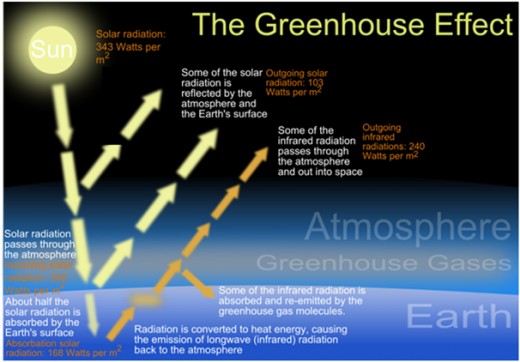
Do we need greenhouse gases?
Yes, we do. Without greenhouse gases, the earth would be 33 degrees Celsius colder than it is at present. That would be a truly "catastrophic" climate change.
Is mankind causing global warming?
So here we come to the big question. The simple answer is that no one knows for sure - no one can prove it. There is a huge body of scientists, meteorologists, climate experts, etc, who believe that mankind's release of CO2 into the atmosphere is the cause of the small but steady average rise of the earth's temperature over the last century, but equally there are large bodies of scientists, climate experts, astro-physicists, geologists, etc. who do not believe that CO2 is a significant factor in climate change.
We have seen how insignificant CO2 is in terms of its volume in the atmosphere, and its effect, compared with other greenhouse gases, upon global warming, and yet everyone seems to be fixated about CO2 emissions. Why? It is the most stable non-condensing greenhouse gas, and its concentration in the atmosphere is steadily rising, even though it is only by just less than 1 part in 200 over the last decade, but is that proof that it is the cause? No it is not. Rising CO2 levels are just one of hundreds of factors which affect climate.
I have not mentioned El Niño, or the Gulf Stream, or any other geological and atmospheric factors which affect the global climate, of which there are many. El Niño is a cyclical pattern of movement of the southern Pacific Ocean, which causes the temperature on the surface of the ocean to warm and cool. It occurs every 2 to 7 years (average 5) and lasts from 7 months to 2 years. It is blamed for some of the biggest weather-created disasters in recent years, such as floods and droughts. This is a large subject in itself, and more can be found at: http://en.wikipedia.org/wiki/El_Ni%C3%B1o-Southern_Oscillation.
We know that CO2 concentrations fluctuate annually as the Spring and Summer in the Northern Hemisphere comes and then gives way to Autumn and Winter. This is less pronounced in the Southern Hemisphere, as there is less land mass away from the equator, so the seasons are much less pronounced in term of plant growth and death. As temperature is varying more in the Northern Hemisphere than it does in the Southern, does this not demonstrate a causal link between CO2 levels and global temperature? Well, quite the opposite, because the concentrations are higher in the winter, when the weather is colder, and the theory is that CO2 is causing a temperature increase. Of course, this particular temperature fluctuation is caused overwhelmingly by the proximity to the sun, mentioned in the introduction to this hub. I just use this example to illustrate a point.
What more can you tell me about CO2 ?
There are some interesting facts about mankind's contribution to the CO2 concentration in the atmosphere compared with other contributors.
For example, cows and other animals produce more CO2 than humans. Dying vegetation produces more CO2 than cows do, and oceans produce more CO2 than dying vegetation. Indeed, since oceans release more CO2 as they warm up, there is a vicious circle whereby the warmer the sea becomes, the more CO2 is released. If it is the case that CO2 causes the earth to warm up, then this will cause a runaway effect with disastrous circumstances. Could the fact that it has not done so so far, show that CO2 is not the key driver of global warming?
These facts show that even if mankind completely ceased to produce any CO2, it might not have any significant impact on the CO2 levels in the atmosphere.
What do the sceptics say?
Firstly, I would like to say that the term "deniers" is extremely offensive and unecessary. It is obviously stolen from "Holocaust Deniers" as a term of abuse and mockery against those who deny something that is proven beyond all reasonable doubt. The term has been adopted by the "man-made climate change believers", because they want to make a point that their case is proven beyond all reasonable doubt, and therefore to argue the opposite point is reprehensible, clearly incorrect, and should not be tolerated.
I am always sceptical of anyone who tries to use such methods to stifle debate and argument against their own view. It tends to be used where they know that their case will not stand up to thorough scrutiny, and therefore they want to suppress debate. This then supports the argument that there must be flaws in the argument for mankind causing global warming, which many are keen to hide.
How would the believers like to be labelled as "global warming cult members", or "global warming terrorists"? It doesn't help anyone, and least of all the pursuance of the facts, to use such derogatory terms on either side of the argument.
But what about the scientific evidence?
1) There is evidence from ice-core samples, that CO2 levels in the atmosphere tend to rise some 800 years after a temperature rise. In other words, CO2 increases in the atmosphere are caused by global warming, not the other way around.
Thus, for what is happening now, we need to look back at the global temperatures in 1200AD, and that puts us in the Medieval Warm Period !
2) For 40 centuries from 8000BC to 4000BC, the earth was warmer than it is now, and there was then no significant production of CO2 by mankind which could have been driving it.
3) Temperatures fell during the post-war economic boom from 1940 to 1967, when mankind was increasing the amount of CO2 it was pumping into the atmosphere at the greatest rate in its history.
4) CO2 levels have previously been ten times their current level, and there is no evidence that that caused a massive increase in global temperature.
5) Sunspot activity can be used to predict how the weather will behave. Since the 1970s, solar physicist Piers Corbin has predicted the weather using sunspot activity, and it is known that, for a time, when the Met Office predicted something different, he bet on their forecast being wrong. He is said to have made a decent amount of money through this, which attracted much attention in 1990, when his predictions of bad weather came true in a year of extreme weather. He runs a company called Weather Action (http://www.weatheraction.com/) which sells its weather predictions to a number of global companies.
6) 400 years of sunspot records show a very close correlation of sunspot activity with the earth's temperature.
Conclusions
This hub is intended to provoke thought about a subject which seems to have become a "universally believed truth" if you read many sources, "beyond the need for further discussion", and "simply to be accepted as fact".
However, surveys show that the general public do not, in the majority, believe that man-made global warming is a fact, and a significant number of key climatology, oceanography, physics, cosmologist and other scientists remain unconvinced that there is a causal link. This is the joy of science, that very few of the biggest issues are able to be proven.
A lengthy and thorough history of the "Discovery of Climate Change" by the American Institute of Physics, can be found at : http://www.aip.org/history/climate/20ctrend.htm. This Institute clearly has a firm belief that the case for man-made climate change is proven, but I am not yet convinced. I would like to keep an open mind. We've all seen too many times how the incorrect can become "universally accepted" as fact through "received wisdom" when the weight of public opinion takes a particular common view on a matter.
All through history, and especially the history of science, "known facts" suddenly became "proven nonsense" when someone made a new discovery.
The revelation (now known as "Climategate") that the data on which the first "conclusive theory" of man-made global warming was based were "massaged" to prove their case, and that the scientists producing the theory refused to let anyone else see the raw data, and tried to destroy it so it could never be used by anyone else to disprove their theory, all add to my disquiet that we are still a long way away from knowing the truth on this matter. For more on Climategate, see: http://www.telegraph.co.uk/comment/columnists/christopherbooker/6679082/Climate-change-this-is-the-worst-scientific-scandal-of-our-generation.html.
For me, there are still too many unknowns, and too many inconsistent facts, for me to be convinced that the trend over the last century for slight global warming (less than 1 degree) has been caused solely by the actions of mankind emitting CO2 into the atmosphere. There is also too much vested interest in the theory being true, from billions of US dollars being spent every year with researchers trying to prove that it is true, to entire industries making huge sums of money from Carbon Trading, and I am made more sceptical by the vicious attacks made on anyone offering an alternative theory, for the reasons stated above in the section "What do the sceptics say?".
Despite that, it is driving some good inventions, such as electric/hybrid cars, solar electricity generation (see my hub entitled: http://hubpages.com/hub/Is-solar-power-worth-it-in-the-UK-home), and making people think before they tear down another rainforest; and all of this is good.
So I would just like to see a continued, reasoned, logical, open debate, with more access to alternative theories, and open debates between believers and sceptics, rather than the rhetoric, and closing down of further debate, and the bigoted view of, and vicious attacks on, anyone who wants to examine the evidence more closely, explore alternative theories, and further the quest to get to the truth.

